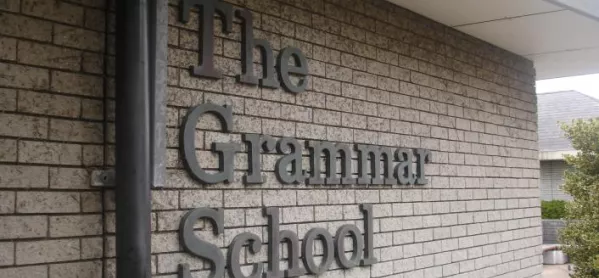The government announced today that 16 grammar schools will receive a share of a £50 million fund to expand their rolls by an extra 4,000 pupils.
In return, the schools have promised to take action to improve access to disadvantaged pupils.
The Department for Education has now published the names of the 16 schools involved, as well as information about what changes they have committed to. Here are five things which the schools say they will do:
1. Giving pupil premium children higher priority
All of the 16 schools say they will give pupil premium children higher priority in their admissions criteria. However, the number of places which will be set aside for such pupils varies from school to school.
For example, Sir William Borlase’s Grammar School in Buckinghamshire says that after the admission of looked after and previously looked after children, 10 children eligible for the pupil premium who have passed the test will be allocated places, representing about 6 per cent of places.
At Queen Mary’s Grammar School in Walsall, after looked after and previously looked after children, pupil premium children will be allocated the next 54 places - about 30 per cent of places.
2. Lowering the pass mark
Eleven of the schools have said they will lower the pass mark for pupil premium children in some fashion.
For example, at Altrincham Grammar School for Boys in Trafford, the pass mark in the selection test will be 10 marks lower for children eligible for the pupil premium.
Kendrick School in Reading has promised to lower the test pass mark by at least 4 per cent for these pupils, while Sir Thomas Rich’s School in Gloucestershire has said it will lower the academic entry requirements for pupil premium pupils for its sixth form entry.
3. Changes to the catchment area
Several schools have said they will make changes to their catchment area to improve access.
At Bournemouth School, “the catchment area from which pupils are prioritised for admission has been made smaller removing more affluent areas and making it easier for those disadvantaged children living in the furthest extent of the catchment to travel to school.”
Meanwhile, at Sir William Borlase’s Grammar School, “the catchment area will change to include a larger rural area, including locations of relative disadvantage including Stokenchurch and Lane End”.
4. Outreach
All of the schools have promised to carry out outreach activities. John Hampden Grammar School in Buckinghamshire has promised “for one day a year, students in Years 4 and 5 in partner schools will experience secondary school lessons in the grammar school”.
5. Partnerships
All of the schools have set out information about partnership arrangements with other schools. For example, Queen Mary’s High School in Walsall has said it will provide continuous professional development for teachers in 10 target primary schools.
What has been the reaction?
Responding to today’s announcement, Comprehensive Future, which campaigns against academic selection, said: “At a time when all school are desperately short of funds, finding £50 million for grammar schools is unfair and unjust.
“Grammar schools create social and educational segregation with schools in surrounding areas left to educate higher numbers of middle and lower attaining pupils, and a disproportionate number of pupils with special educational needs.”
Jon Andrews, a researcher at the Education Policy Institute thinktank, said that “even with quota systems, pupils from disadvantaged backgrounds are net losers from selection”.





